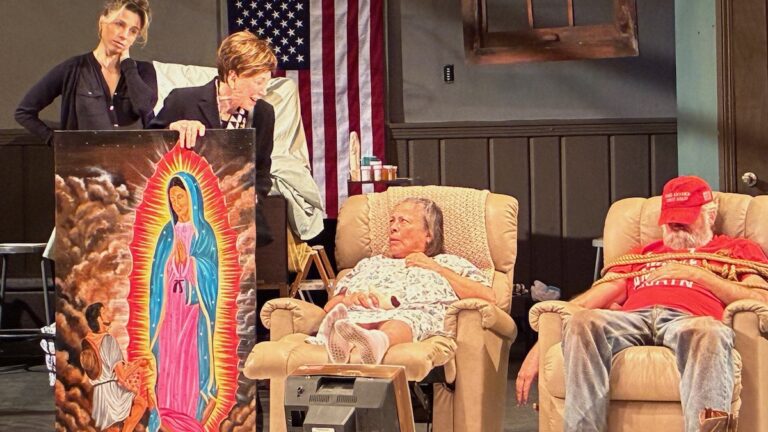
The original Party of Five television series made its debut in September 1994. Created by Christopher Keyser and Amy Lippman, it chronicled the lives and misadventures of the five youthful Salinger siblings, following the loss of their parents in a car accident. Last month, Keyser and Lippman have brought back a brand new version of the series with a twist and it is currently streaming on Freeform, a streaming platform owned by Walt Disney Television, which specializes in programming for teenagers and young adults.
In this iteration of the series Lippman is joined by Mexican-American Gabriel Llanas (previously Supervising Producer of Supergirl) as co-Executive Producer while Keyser is now committed to other projects.

This new reboot focuses on the five Acosta children, who must survive in Los Angeles as a family unit after their restaurant-owning parents are suddenly deported to Mexico. The Acosta siblings are portrayed by Brandon Larracuente (Emilio), Emily Tosta (Lucia), Niko Guardado (Beto) and Elle Paris Legaspi (Valentina). The fifth Acosta child is a non-speaking infant.
In the opening episode, a team from the U.S. Immigration Enforcement ICE) invade the Acosta’s successful restaurant and place the children’s parents, Javier (Bruno Bichir) and Gloria (Fernanda Urrejola) under arrest for having entered the U.S. illegally. The Acosta siblings, after they overcome the shock of this monumental disruption to their happy family life, must not now deal with the task of keeping the restaurant going and keep their family from being separated by the city’s Department of Family Services, while also struggling with their own individual adolescent problems.
Party of Five realistically balances the very real socio/political environment they are now facing with the very real often painful, social maturation they must deal with on a day to day basis.
The eldest, socially confident Emilio, on his way to becoming a successful singer/songwriter and band leader, must now put his ambitions on hold to take over managing the restaurant. His academically brilliant 16-year-old sister Lucia, just entering the insecurities of young adulthood, is struggling to help her academically challenged fraternal twin, Beto, and take on added maternal responsibilities for her infant sister. Beto, the most sensitive of the five children, is struggling in all areas, particularly aware that the girl he adores has taken a fancy to his older brother. Precocious pre-teen Valentina cannot let go of her parents, constantly phoning and texting them at their current residence in Tijuana, Mexico.
Larracunte, who is of Puerto Rican heritage, grew up in New York, and began his show business performing with a small opera company. “I never had to deal with the immigration problems the Acostas are facing.” However, it is different for Emily Tosta, who portrays 16-year-old Lucia. “I’m an immigrant myself, from the Dominican Republic. I came here when I was 12 years old. And obviously there was a period of time when my mom and I were not documented to work, so I have definitely experienced countless immigration difficulties and so has my mother.” Tosta adds, “I mean my grandmother, she can’t come into this country. Sadly, she and my mother haven’t seen each other in over 10 years because of the current policies. So yeah, I’ve definitely experienced firsthand a lot of immigration troubles.”
Nico Guardado, who plays Beto, the fraternal twin to Lucia, is a second-generation Mexican-American (previously recurring on ABC’s The Goldbergs), the son of Major League Baseball All-Star Pitcher Eddie Guardado, the son of a Mexican immigrant who, for a time, picked fruit in California. “I’m the oldest of my siblings,” says Nico. “From the day my brother was born, my parents instilled in me that I had to be a role model. I had to set a positive example for my younger siblings. That’s what I bring to my character.”

Exec. Producer Amy Lippman and actress Elle Paris Legaspi (Ctr)
Elle Paris Legaspi, who plays Valentina, has been performing most of her life, including dancing on stage by the age of five. “I can’t even imagine what it would be like to lose my parents,” she admits. “If that were happening to me and my family right now, I’d be very sad because I’d need them for so much. I depend on my parents a whole lot because I am 11 years old.”
“The issues we deal in the series are complex,” said co-creator Lippman. “The Acosta children realize that Social Services could disrupt their household and place them in foster care. In an early episode, the first person who voices any kind of opposition to what the family has done (coming to the country without documentation) is a Mexican American. It’s not just Caucasian people who have an attitude about people coming into the country. There are people who are here of Latinx backgrounds who also have issues and concerns. They have a problem welcoming a community of people who did not come to this country the same way they did”.
Lippman also talked about the writers room and the importance of bringing on board Latinx writers, adding, “We’re looking at immigration from lots of points of view. I think that’s the goal. We are trying not to pass judgment on this family and how they got here. We’re just saying this happens. It’s just a situation that lots of people now find themselves in. And always the kids have no choice in the matter.”




